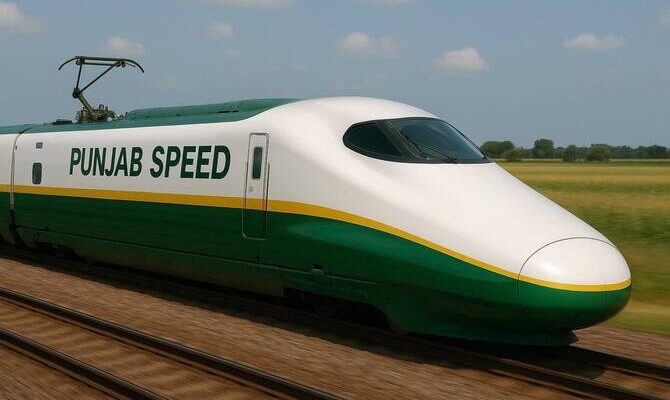
Pakistan to Launch Its First Bullet Train: Connecting Lahore and Karachi in Just Five Hours
Published on August 25, 2025
Pakistan Railways is set to revolutionize domestic travel with the launch of the country’s first-ever bullet train. Slated to begin operations by 2030, the high-speed service will drastically reduce the travel time between Lahore and Karachi to just five hours—a significant improvement over the current 18 to 22-hour journey. This ambitious project, a major component of the China-Pakistan Economic Corridor (CPEC), promises to modernize Pakistan’s transportation network, enhance connectivity, and stimulate economic growth.
A Transformative Shift for Travel and Trade
The bullet train is expected to bring unprecedented convenience and speed to passengers traveling between Pakistan’s two largest cities. With a journey time of only five hours, the train will provide a more efficient, affordable, and eco-friendly alternative to both road and air travel. The service is also poised to boost trade and regional connectivity by making it easier to transport goods between cities and connecting Pakistan to broader trade initiatives under CPEC.
The Main Line 1 (ML-1) Upgrade: The Backbone of the Project
As part of the broader Main Line 1 (ML-1) upgrade, this project is one of the most critical infrastructure developments under CPEC. The ML-1 upgrade will modernize the existing 1,215-kilometer rail line between Karachi and Lahore. This will include extensive work on upgrading tracks, rebuilding bridges, and installing advanced signaling systems capable of supporting trains traveling at speeds of up to 250 kilometers per hour.
The bullet train will be one of the key features of the ML-1 line, making stops in major cities such as Hyderabad, Multan, and Sahiwal. The train’s average speed will be around 243 kilometers per hour, which will drastically reduce travel time for both passengers and freight.
Economic and Social Impact
Beyond shortening travel times, the ML-1 upgrade is expected to bring significant economic benefits to Pakistan. The construction and operation of the bullet train will create thousands of jobs, providing a much-needed economic boost to provinces like Sindh and Punjab. In addition, the project will generate opportunities in sectors such as manufacturing, construction, and services, stimulating local economies across the country.
The bullet train will also offer a more affordable alternative to expensive air travel, with ticket prices expected to range between PKR 5,000 and PKR 10,000, making it an attractive option for students, professionals, and families. While it will be more expensive than conventional train services, it will still be more cost-effective than flying, making long-distance travel more accessible to a wider population.
Strengthening Trade and Connectivity
One of the key objectives of the bullet train project is to increase Pakistan’s rail freight share from the current 4% to 20% by 2030. This will enhance the country’s competitiveness in the regional and international markets by providing a faster, more reliable mode of transportation for goods.
Moreover, the train will strengthen Pakistan’s position in regional trade by facilitating smoother transport links with China and Central Asia under CPEC. As the rail network expands, Pakistan is set to play a more significant role in regional commerce.
Challenges and Financial Considerations
Despite its promising benefits, the bullet train project is not without its challenges. The $6.8 billion price tag for the development is a significant burden on Pakistan’s finances, particularly in light of the country’s current economic situation. Although Chinese companies have pledged support, additional funding will be necessary to complete the project.
There are also logistical challenges, such as land acquisition and environmental concerns, that could slow down progress. The construction of new tracks and stations must be carefully managed to minimize disruptions to local communities. Furthermore, there is a risk of delays, as has been the case with similar projects in the past. However, the Pakistani government remains committed to meeting the 2030 deadline for the launch.
Strategic Importance of the Bullet Train
Once completed, the bullet train will significantly reduce fuel consumption by offering an energy-efficient alternative to road and air travel. It will also alleviate road congestion, as more people shift from cars and buses to the train, easing traffic on the country’s highways.
From a strategic perspective, this project aligns with Pakistan’s broader economic goals and will contribute to the country’s development as a key player in the regional trade network. The bullet train will not only enhance Pakistan’s transport infrastructure but also improve the country’s standing as a hub for international commerce.
Conclusion: A Game-Changer for Pakistan
The bullet train project represents a turning point for Pakistan’s transportation system, with the potential to transform travel, trade, and economic growth. While challenges remain, particularly regarding funding and potential delays, the completion of this project will mark a significant milestone in Pakistan’s development.
With a growing population, an increasing demand for better transport options, and a strategic location at the heart of regional trade networks, Pakistan is poised to reap substantial benefits from this ambitious initiative. If successful, the bullet train will not only redefine domestic travel but also strengthen Pakistan’s position in the global economic landscape.



